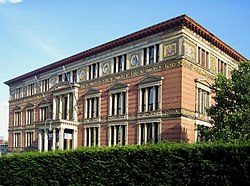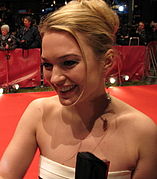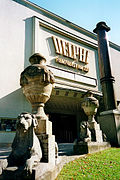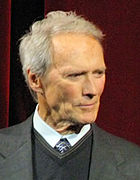Berlin International Film Festival
| File:Berlin International Film Festival logo.svg | |
| Location | Berlin, Germany |
|---|---|
| Founded | 1951 |
| Awards | Golden Bear, Silver Bear |
| Artistic director | Carlo Chatrian |
| No. of films | 441 (945 screenings) in 2014 |
| Website | berlinale |
The Berlin International Film Festival (German: Internationale Filmfestspiele Berlin), usually called the Berlinale, is a film festival held annually in Berlin, Germany.[1] Founded in West Berlin in 1951,[2] the festival has been held every February since 1978 and is one of the "Big Three" alongside the Venice Film Festival in Italy and the Cannes Film Festival in France.[3][4] Since 2019, Mariette Rissenbeek serves as the executive director of the festival, while Carlo Chatrian is the artistic director.[5]
With around 300,000 tickets sold and 500,000 admissions each year, it has the largest public attendance of any annual film festival.[6] Up to 400 films are shown in several sections across cinematic genres. Around twenty films compete for the festival's top awards, called the Golden Bear and several Silver Bears.[6]
The European Film Market (EFM), a film trade fair held simultaneously to the Berlinale, is a major industry meeting for the international film circuit.[7] The trade fair serves distributors, film buyers, producers, financiers and co-production agents. The Berlinale Talents, a week-long series of lectures and workshops, is a gathering of young filmmakers held in partnership with the festival.[8]
The film festival, EFM, and other satellite events are attended by around 20,000 professionals from over 130 countries every year.[9] More than 4,200 journalists produce media coverage in over 110 countries.[10] At some high-profile feature film premieres held during the festival, movie stars and celebrities are present and photographed on a red carpet.[11]
History[edit | edit source]
During the peak of the Cold War in 1950, Oscar Martay, a film officer of the Information Service Branch of the American High Commissioner for Germany stationed in Berlin, proposed the idea of a film festival in Berlin.[2][12][13][14] The proposal was put through a committee including members of the Senate of Berlin and people from the German film industry on 9 October 1950.[2] Through his efforts and influence, the American military administration was persuaded to assist and to give loans for the first years of the Berlin International Film Festival, which commenced in June 1951[2][12][15] with film historian Dr. Alfred Bauer as its first director, a position he would hold until 1976.[16] Alfred Hitchcock's Rebecca opened the first festival at the Titiana-Palast in Steglitz on 6 June 1951.[17] The first festival ran from 6–17 June[17] with Waldbühne being another festival venue.[2][17]
The winners of the first awards in 1951 were determined by a West German panel, and there were five winners of the Golden Bear, divided by categories and genres.[18] Cinderella, which won the Golden Bear for a Music Film,[19] also won the audience award.[17] The FIAPF (Fédération Internationale des Associations de Producteurs de Films) banned the awarding of jury prizes at the festival[17] so between 1952 and 1955, the winners of the Golden Bear were determined by the audience members.[20] In 1956, FIAPF formally accredited the festival[17] and since then the Golden Bear has been awarded by an international jury.[20]
During the Cold War, a selection of the films were also screened in East Berlin.[21]
The 20th edition of the festival in 1970 was cut short and awards not issued following controversy over the showing of Michael Verhoeven's film o.k..[17] The following year, the festival was reformed and a new International Forum for New Cinema was created.[17]
Bauer was succeeded by film journalist Wolf Donner in 1976,[22] who gave German films higher priority.[17] After his first Berlinale in June 1977, he successfully negotiated the shift of the festival from the June to February (22 February – 5 March 1978), a change which has remained ever since.[23] That festival, the 28th edition, saw the jury award the Golden Bear to Spain for its contribution to the festival rather than a specific film.[17] The three Spanish films which were screened at the festival and won it were short film Ascensor directed by Tomás Muñoz and feature films La palabras de Max by Emilio Martínez Lázaro and Las truchas by José Luis García Sánchez.[24] The 1978 festival also saw the start of the European Film Market.[17]
After only three years in the role, Donner was followed by Moritz de Hadeln who held the position from 1980 [25] until director Dieter Kosslick took over in 2001.[26]
In 2000, the Theater am Potsdamer Platz, known as the Berlinale Palast during the festival, became the festival's principal venue.[17] Since 2009, Friedrichstadt-Palast has also been used.
In June 2018, it was announced that Mariette Rissenbeek would serve as the new executive director alongside artistic director Carlo Chatrian. They assumed their posts after Kosslick's final edition in 2019. Rissenbeek became the first woman to lead the Berlinale.[27][28]
A shortened 71st festival took place virtually in March 2021 due to the COVID-19 pandemic.[29][30]
Festival programme[edit | edit source]
The festival is composed of seven different film sections.[31] Films are chosen in each category by a section director with the advice of a committee of film experts. Categories include:
Competition: comprises feature-length films yet to be released outside their country of origin. Films in the Competition section compete for several prizes, including the top Golden Bear for the best film and a series of Silver Bears for acting, writing and production.[32]
Encounters: comprises independent film that aims to foster aesthetically and structurally daring works from innovative filmmakers. Its goal is to support new perspectives in cinema and to give more room to diverse narrative and documentary forms in the official selection. Conceived as a counterpoint and a complement to Competition, Encounters is a competitive section devoted to new cinematic visions. The films selected will challenge traditional forms and ask viewers to reconsider their positions in relation to them. Being a mirror of the different ways of production that have developed in the 21st century and reflecting this vibrant energy, Encounters will become a meeting point for filmmakers and producers, programmers and film critics, cinephiles and festival lovers.[33]
Panorama: comprises new independent and arthouse films that deal with "controversial subjects or unconventional aesthetic styles". Films in the category are intended to provoke discussion, and have historically involved themes such as LGBT issues.[34]
Forum: comprises experimental and documentary films from around the world with a particular emphasis on screening works by younger filmmakers. There are no format or genre restrictions, and films in the Forum do not compete for awards.[35]
Generation: comprises a mixture of short and feature-length films aimed at children and youths. Films in the Generation section compete in two sub-categories: Generation Kplus (aimed at those aged four and above) and Generation 14plus (aimed at those aged fourteen and above). Awards in the section are determined by three separate juries—the Children's Jury, the Youth Jury and an international jury of experts—, whose decisions are made independently of one another.[36]
Perspektive Deutsches Kino: comprises a wide variety of German films, with an emphasis on highlighting current trends in German cinema. There are few entry requirements, enabling emerging filmmakers to display their work to domestic and international audiences.[37]
Berlinale Shorts: comprises domestic and international short films, especially those that demonstrate innovative approaches to filmmaking. Films in the category compete for the Golden Bear for the best short film, as well as a jury-nominated Silver Bear.[38]
Retrospective: comprises classic films previously shown at the Berlinale, with films collated from the Competition, Forum, Panorama and Generation categories. Each year, the Retrospective section is dedicated to important themes or filmmakers. The special Homage series similarly examines past cinema, with a focus on honouring the life work of directors and actors.[39]
In addition to the seven sections, the Berlinale also contains several linked "curated special series", including the Berlinale Special, Gala Special, Forum Expanded, and the Homage.[31] In 2020, Culinary Cinema was dropped while a new section called Encounters was established.[40] Since 2002, a 50-second trailer opens the performances in all sections of the festival with the exception of the Retrospective.[citation needed]
Main competition jury presidents[edit | edit source]
Since 1956, the jury of the Festival has been chaired by an internationally recognized personality of cinema.[41]
| Year | President | Profession | Nationality |
|---|---|---|---|
| 1956 | Marcel Carné | Director | France |
| 1957 | Jay Carmody | Film Critic | United States |
| 1958 | Frank Capra | Director | United States |
| 1959 | Robert Aldrich | Director | United States |
| 1960 | Harold Lloyd | Actor | United States |
| 1961 | James Quinn | Film Administrator | United Kingdom |
| 1962 | King Vidor | Director | United States |
| 1963 | Wendy Toye | Dancer | United Kingdom |
| 1964 | Anthony Mann | Director, Actor | United States |
| 1965 | John Gillett | Film Critic | United Kingdom |
| 1966 | Pierre Braunberger | Film Producer | France |
| 1967 | Thorold Dickinson | Director | United Kingdom |
| 1968 | Luis García Berlanga | Director | Spain |
| 1969 | Johannes Schaaf | Director | Germany |
| 1970 | George Stevens | Director | United States |
| 1971 | Bjørn Rasmussen | Poet | Denmark |
| 1972 | Eleanor Perry | Screenwriter | United States |
| 1973 | David Robinson | Film Critic | United Kingdom |
| 1974 | Rodolfo Kuhn | Director | Argentina |
| 1975 | Sylvia Syms | Actress | United Kingdom |
| 1976 | Jerzy Kawalerowicz | Director | Poland |
| 1977 | Senta Berger | Actress | Austria |
| 1978 | Patricia Highsmith | Writer | United States |
| 1979 | Jörn Donner | Director | Finland |
| 1980 | Ingrid Thulin | Actress | Sweden |
| 1981 | Jutta Brückner | Director, Screenwriter | Germany |
| 1982 | Joan Fontaine | Actress | United States |
| 1983 | Jeanne Moreau | Actress | France |
| 1984 | Liv Ullmann | Actress | Norway |
| 1985 | Jean Marais | Actor | France |
| 1986 | Gina Lollobrigida | Actress | Italy |
| 1987 | Klaus Maria Brandauer | Actor | Austria |
| 1988 | Guglielmo Biraghi | Film Critic | Italy |
| 1989 | Rolf Liebermann | Composer | Switzerland |
| 1990 | Michael Ballhaus | Cinematographer | Germany |
| 1991 | Volker Schlöndorff | Director, Screenwriter | Germany |
| 1992 | Annie Girardot | Actress | France |
| 1993 | Frank Beyer | Director | Germany |
| 1994 | Jeremy Thomas | Film Producer | United Kingdom |
| 1995 | Lia van Leer | Film Programmer, Film Archivist | Israel |
| 1996 | Nikita Mikhalkov | Actor, Director | Russia |
| 1997 | Jack Lang | Politician | France |
| 1998 | Ben Kingsley | Actor | United Kingdom |
| 1999 | Ángela Molina | Actress | Spain |
| 2000 | Gong Li | Actress | China |
| 2001 | Bill Mechanic | Film Producer | United States |
| 2002 | Mira Nair | Director | India |
| 2003 | Atom Egoyan | Director | Canada |
| 2004 | Frances McDormand | Actress | United States |
| 2005 | Roland Emmerich | Director | Germany |
| 2006 | Charlotte Rampling | Actress | United Kingdom |
| 2007 | Paul Schrader | Director, Screenwriter | United States |
| 2008 | Costa-Gavras | Director | France |
| 2009 | Tilda Swinton | Actress | United Kingdom |
| 2010 | Werner Herzog | Director, Screenwriter | Germany |
| 2011 | Isabella Rossellini | Actress | Italy |
| 2012 | Mike Leigh | Director, Screenwriter | United Kingdom |
| 2013 | Wong Kar-wai | Director | Hong Kong |
| 2014 | James Schamus | Screenwriter | United States |
| 2015 | Darren Aronofsky | Director, Screenwriter | United States |
| 2016 | Meryl Streep | Actress | United States |
| 2017 | Paul Verhoeven | Director, Screenwriter | Netherlands |
| 2018 | Tom Tykwer | Director, Screenwriter | Germany |
| 2019 | Juliette Binoche | Actress | France |
| 2020 | Jeremy Irons | Actor | United Kingdom |
In 2021, the directors of six previous Golden-Bear-winning films will determine the awards for the Competition of the 71st Berlinale. There will not be a President of the Jury this year. The jury members are Mohammad Rasulof, Nadav Lapid, Adina Pintilie, Ildikó Enyedi, Gianfranco Rosi and Jasmila Žbanić.[42]
Awards[edit | edit source]
The Golden Bear (German: Goldener Bär) is the highest prize awarded for the best film at the Berlin International Film Festival.
Golden Bear (Goldener Bär)
- Best Motion Picture (since 1951)
- Best Short Film (since 1956)
- Lifetime Achievement (Honorary Golden Bear) (since 1982)[43]
Silver Bear (Silberner Bär)
The Silver Bear was introduced in 1956 as an award for individual achievements in direction and acting, and for best short film.[citation needed]
In 1965 a special film award for the runner-up to the Golden Bear was introduced. Although its official name was the Special Jury Prize from 1965 to 1999, and has been the Jury Grand Prix since 2000, it is commonly known as the Silver Bear (just like the awards for individual achievements) as it is regarded as a second place award after the Golden Bear.[citation needed]
- Grand Jury Prize (since 1965)
- Silver Bear Jury Prize (since 2021)
- Best Short Film (since 1956)
- Best Director (since 1956)
- Silver Bear for Best Leading Performance (since 2021)
- Silver Bear for Best Supporting Performance (since 2021)
- Best Screenplay (since 2008)
- Silver Bear for Outstanding Artistic Contribution (since 2008)
Other awards at the Berlin International Film Festival
- Panorama Publikumspreis, the Audience Award
- Berlinale Camera, a special award for services to the Festival
- A Crystal Bear for the Best Film in the 14plus section of the Generation Competition
- A Crystal Bear for the Best Film in the Kplus section of the Generation Competition
- Teddy Award for films with LGBT topics
- Shooting Stars Award for young European acting talent, awarded by European Film Promotion
Former awards at the Berlin International Film Festival
- Best Actor (1956–2020) (replaced by Best Leading Performance and Best Supporting Performance)
- Best Actress (1956–2020) (replaced by Best Leading Performance and Best Supporting Performance)
- Alfred Bauer Prize (1987-2020) (replaced by Jury Prize)
- Outstanding Single Achievement (1956–2005)
- Special Artistic Achievement (1956–2007) (replaced by Outstanding Artistic Contribution)
- Film Music (2002–2007)
European Film Market[edit | edit source]

The European Film Market (EFM) is one of three largest movie markets in the world.[44] Started in 1978,[17] it is the business centre during the time of the Berlinale. The EFM is the major venue for film producers, buyers, financiers, sales agents, and distributors. Being the first Film Market of the year together with the Marché du Film in Cannes in May and the American Film Market in November, the EFM is one of the three major meetings of the film industry.
It is a professional trade event, therefore it is open to registered industry insiders. In 2020, 971 screenings of 732 registered movies took place with 525 films celebrating their premiere.[45]
The EFM is the follow-up event of the Filmmesse, which was led by Aina Bellis from 1980 to 1987. In 1988, Aina Bellis was succdeeded by Beki Probst. From 2014 to October 2020, Matthijs Wouter Knol took over the position with long-standing EFM-director Beki Probst by his side. In November 2020, Dennis Ruh became the director of the EFM.[46]
The trade fair provides exhibition space for companies presenting their current line-up. It organizes over 1000 screenings of new films, which take place at movie theatres around Potsdamer Platz. In 2007, the CinemaxX and CineStar were used to showcase new productions. In 2010, the Astor Film Lounge showed market screenings in three dimensions using digital RealD technology.
The Berlinale Co-Production Market is a three-day networking platform for producers and financiers, as well as broadcasting and funding representatives who are participating in international co-productions. At the Berlinale Co-Production Market, producers can introduce selected projects and find co-production partners and/or financiers in one-on-one meetings.
Berlinale Talents[edit | edit source]

Commencing in 2003, the Berlinale has partnered with the Berlinale Talents (previously Berlinale Talent Campus), which is a winter school for "up-and-coming filmmakers" that takes place at the same time as the festival. The Talent Campus accepts about 250 applicants each year; the attendees come from around the world, and represent all of the filmmaking professions.[47]
The event runs six days during the Berlinale and features lectures and panel discussions with well-known professionals addressing issues in filmmaking. Workshops, excursions, personal tutoring, coaching, and training of participants from different fields of work are part of the programme.
The proceedings include presentations by distinguished experts,[48] who have included Park Chan-wook, Frances McDormand, Stephen Frears, Dennis Hopper, Jia Zhangke, Walter Murch, Shah Rukh Khan, Joshua Oppenheimer, Anthony Minghella, Charlotte Rampling, Walter Salles, Ridley Scott, Raoul Peck, Tom Tykwer, Mike Leigh, Tilda Swinton, and Wim Wenders.[citation needed] Many of these presentations and lectures are archived, both as video recordings and as transcripts, on the Talent Campus' website.
Gallery[edit | edit source]
Christopher Lee at Berlinale in 2013
Jeremy Irons at Berlinale in 2013
Potsdamer Platz houses two large multiplex cinemas
Sharon Stone at the premiere of When a Man Falls in the Forest at Berlinale in 2007
Cubix Kino at Alexanderplatz
Sophia Myles at Berlinale in 2007
Roland Emmerich, 2005 Jury President
Clint Eastwood at Berlinale in 2007
Werner Herzog, 2010 Jury President
See also[edit | edit source]
References[edit | edit source]
- ↑ China film wins top Berlin award, BBC News
- ↑ 2.0 2.1 2.2 2.3 2.4 "Oscar Martay". Archived from the original on 26 April 2015. Retrieved 25 January 2012.
- ↑ Valck, Marijke de; Kredell, Brendan; Loist, Skadi (26 February 2016). Film Festivals: History, Theory, Method, Practice. ISBN 9781317267218.
- ↑ Scott Roxborough (16 February 2020). "Berlin Rebooted: Festival Shuffles Lineup, Aims for Recharged Market". The Hollywood Reporter.
- ↑ "Berlinale 2020: Carlo Chatrian and Mariette Rissenbeek Announce the First Developments". Berlin International Film Festival. 28 March 2019. Retrieved 19 December 2019.
- ↑ 6.0 6.1 Facts and Figures of the Berlinale, berlinale.com
- ↑ Berlin Film Festival a market force, Variety, 13. February 2008
- ↑ Berlin Talent campus wins hearts Archived 15 April 2012 at the Wayback Machine, fest21.com
- ↑ 2009 Berlinale Press release, berlinale.de, 18. February 2008
- ↑ Kosslick zieht positive Berlinale-Bilanz Archived 17 February 2012 at the Wayback Machine(German), PR-inside.com
- ↑ Madonna at the Berlinale at YouTube, 19. February 2008
- ↑ 12.0 12.1 The Berlinale, Berlin’s International Film Festival, german-way.com, retrieved 24/7/2016
- ↑ Germany, SPIEGEL ONLINE, Hamburg. "60 Years of Berlinale: A Film Festival of Propaganda, Stars and Scandal". SPIEGEL ONLINE. Retrieved 24 July 2016.
{{cite web}}: CS1 maint: multiple names: authors list (link) - ↑ Wong, Cindy H. (1 January 2011). Film Festivals: Culture, People, and Power on the Global Screen. Rutgers University Press. ISBN 9780813551210.
- ↑ Berlin International Film Festival, Encyclopædia Britannica, retrieved 24/7/2016
- ↑ "Archive 1951: The beginnings". berlinale.de. Berlinale Press Office. Retrieved 25 February 2018.
- ↑ 17.00 17.01 17.02 17.03 17.04 17.05 17.06 17.07 17.08 17.09 17.10 17.11 17.12 "Berlinale beginnings". Variety. 8 February 2012. Retrieved 16 February 2020.
- ↑ "Juries 1951".
- ↑ "Prizes & Honours 1951". Berlinale. Retrieved 16 February 2020.
- ↑ 20.0 20.1 "- Berlinale – Archive – Annual Archives – 1952 – Juries". Retrieved 16 February 2020.
- ↑ Myers, Harold (29 June 1960). "Berlin Film Fest Unreeling". Variety. p. 5. Retrieved 13 February 2021 – via Archive.org.
- ↑ "Archive 1977: A promising start for Wolf Donner". berlinale.de. Berlinale Press Office. Retrieved 25 February 2018.
- ↑ Langford, Michelle (2012). Directory of World Cinema: Germany. Vol. 9. Bristol, UK / Chicago, USA: Intellect. p. 30. ISBN 978-1-84150-465-0.
- ↑ "PRIZES & HONOURS 1978". berlinale.de. Archived from the original on 15 October 2013. Retrieved 16 February 2020.
- ↑ "Archive 1980: Moritz de Hadeln's first year: Consequent Renewal". berlinale.de. Berlinale Press Office. Retrieved 25 February 2018.
- ↑ "Archive 2002: All remains new". berlinale.de. Berlinale Press Office. Retrieved 25 February 2018.
- ↑ Barraclough, Leo (22 June 2018). "Mariette Rissenbeek, Carlo Chatrian to Become Co-Chiefs of Berlin Film Festival". Variety. Retrieved 19 December 2019.
- ↑ Mueller, Matt (1 August 2018). "Berlin Film Festival's new co-chief Mariette Rissenbeek on her appointment and future plans". Screen Daily. Retrieved 19 December 2019.
- ↑ "71st International Film Festival Berlin - Berlinale". visitberlin.de. Retrieved 2 January 2021.
- ↑ Keslassy, Elsa (16 December 2020). "Berlin Film Festival Set to Go Virtual for 71st Edition (EXCLUSIVE)". Variety. Retrieved 2 January 2021.
- ↑ 31.0 31.1 Berlinale.de (2010). "The Festival Sections: An Overview". Archived from the original on 8 February 2010. Retrieved 7 February 2010.
- ↑ Berlinale.de (2010). "Competition". Archived from the original on 12 February 2010. Retrieved 7 February 2010.
- ↑ "Encounters".
- ↑ Berlinale.de (2010). "Panorama". Archived from the original on 8 February 2010. Retrieved 7 February 2010.
- ↑ Berlinale.de (2010). "Forum". Retrieved 7 February 2010.
- ↑ Berlinale.de (2010). "Generation". Retrieved 7 February 2010.
- ↑ Berlinale.de (2010). "Perspektive Deutsches Kino". Retrieved 7 February 2010.
- ↑ Berlinale.de (2010). "Berlinale Shorts". Retrieved 7 February 2010.
- ↑ Berlinale.de (2010). "Retrospective & Homage". Retrieved 7 February 2010.
- ↑ Berlinale.de. "Festival Sections". Retrieved 10 February 2020.
- ↑ "Juries 1956".
- ↑ https://www.berlinale.de/en/festival/awards-and-juries/international-juy.html
- ↑ "THE HONORARY GOLDEN BEAR". Internationale Filmfestspiele Berlin. Retrieved 10 December 2017.
- ↑ Kodak Cinema&Television Press Release, www.kodak.com
- ↑ "Facts & Figures - European Film Market".
- ↑ "Filmmarkt mit neuer Leitung".
- ↑ Berlinale Talents, berlinale-talentcampus
- ↑ Talent Campus adds to lineup, Variety
External links[edit | edit source]
{{URL|example.com|optional display text}}- Berlin International Film Festival at the Internet Movie Database
- Berlin Life: An introduction to the Berlin Film Festival
Template:Berlin International Film Festival Template:Film festivals
- Articles containing German-language text
- Pages using Lang-xx templates
- Articles with unsourced statements from January 2019
- Articles with unsourced statements from February 2018
- Berlin International Film Festival
- 1951 establishments in Germany
- Annual events in Berlin
- February events
- Film festivals established in 1951
- Film festivals in Berlin
- Film markets
- Winter events in Germany




















